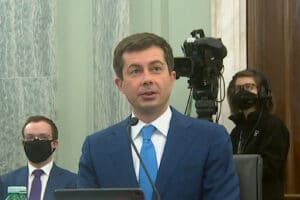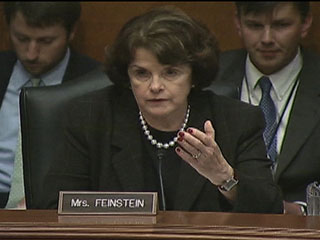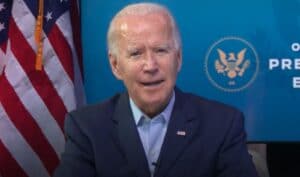
The Biden administration’s pro-EV stance doesn’t necessarily required the elimination of gas- and diesel-powered vehicles at the same time, according to Transportation Secretary Pete Buttigieg.
Buttigieg, the former mayor of South Bend, Indiana and one-time presidential candidate, offered up the insight during a U.S. House hearing Thursday. He said he is unaware of any desire or plan to ban the production and sale of new gas-powered vehicles by 2035.
The push comes from California, which implemented the ban last year, and the state’s two U.S. Senators, Dianne Feinstein and Alex Padilla. The duo sent President Joe Biden a letter last week asking him to set a timetable for phasing the sale of those vehicles. Biden came out against the plan during the campaign.
Apparently, nothing has changed since Jan. 20, as Buttigieg noted he had “not heard of anything to that effect at the national or federal level,” according to Reuters. He did acknowledge the efforts of General Motors and other automakers looking to end production by then, but noted he’s not “heard of that in a mandatory context but that certainly seems to be where the U.S. auto industry is headed.”
Biden campaigned on an aggressively EV-friendly platform, calling for the installation of 500,000 new EV chargers by the end of 2030 and 1 million new jobs in the automotive industry, primarily expected to rise out of the growth of the zero-emission push.
The call gets louder

Unsurprisingly, Feinstein and Padilla are gaining support from other Democrats in Congress. This week, more than 70 House Democrats sent Biden a letter, pressing for tougher emissions and fuel economy rules, including a mandate requiring 60% of new vehicles be zero emission. Additionally, 10 more Senators joined that call, led by Massachusetts Democrat Edward Markey.
In their own letter, they called for the new administration to reinstate the more stringent rules put in place by the Obama administration. Those rules, which Biden helped craft as vice president, required a 5% annual improvement in the reduction of greenhouse gas emissions and fuel economy through 2025. He then went a step further.
“We also urge you to set a date by which new sales of fossil fuel vehicles will end entirely, as California and Massachusetts have done by 2035, to ensure that we are on a trajectory to achieve the near-zero emission fleet that scientists have called for by 2050,” Markey wrote.
Senators Dick Durbin (D-Illinois), Sheldon Whitehouse (D-Rhode Island), Ben Cardin (D-Maryland), Chris Van Hollen (D-Maryland), Richard Blumenthal (D-Connecticut), Jeff Merkley (D-Oregon), Elizabeth Warren (D-Massachusetts), Martin Heinrich (D-New Mexico), and Bob Casey (D-Pennsylvania) joined Markey in signing the letter.

Why 2035?
The push for 2035 stems from the efforts of several countries in Europe that initially began putting a ban in place by 2040, but several, like Great Britain, have shortened the timeframe to 2030 or 2035. The earlier deadline allows for hybrids and other zero-emission vehicles to be sold with 2035 being the drop dead date for the switch to battery-electric only.
A slew of European automakers ranging from Bentley to Volvo to Jaguar and Land Rover have already committed to battery-electric-only line-ups by that date and others are pushing to meet the mandate as well. Nearly a dozen legacy makers are making the push toward all-electric futures.
In the U.S., California Governor Gavin Newsome issued an order last fall to ban the sale of ICE-powered vehicles by 2035 — signing it on the hood of a new Ford Mustang Mach-E — and New Jersey followed suit a month later. The aforementioned GM revealed its plans earlier this year to shift to selling only zero-emissions vehicles by 2035.








Instead of banning the sales of gas engines cars Biden should just resume tax credits for people wanting to buy tesla abd GM Evs anyway!!
No mandates or bans! the free market can determine what people will buy. There is no infrastructure or path to responsible development…only knee-jerk reactions and gaslighting. California should get its house in order prior to mandating what the rest of the country ought to be doing.
You realize that, from the very beginning of the U.S. the government played a role in how people and goods are transported? It helped back the canal-building frenzy. It invested in railroads, among other things, providing large rights of way in return for investment in rail. Without government backing the airline industry never would have become what it is. Do I need remind you of the money invested in highways? Or how much the feds spend every year to both subsidize the oil industry directly, never mind protect the shipping routes for imported oil? I can continue, if you’d like, but there is no absolutely free market when it comes to transportation, Don. There are only knee-jerk comments and gaslighting by those who pretend what we have today is a result of a purely free market.
Paul A. Eisenstein